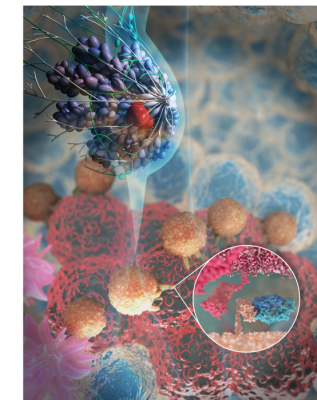Researchers at Peter Mac have uncovered that specialised T-cells, part of the immune defence against cancer, that are present in the breast tissue of patients with triple negative breast cancer can help activate the body’s immune system to fight against the cancer.

Dr Balaji Virassamy, PhD Student in a laboratory dedicated to finding new therapeutic approaches to breast cancer, said the finding was incredibly important from an immunotherapeutic point of view.
“Previously our research demonstrated that specialised T-cells, called CD8+ resident T cells, could adapt to live in breast cancers and in breast tissue. These T cells were different to those circulating in blood and were responsible for killing tumour cells in patients with triple negative breast cancer,” Dr Virassamy said.
“Our new finding uncovered that these CD8+ resident T cells are critical in determining how well the breast cancer will respond to immunotherapy treatment. The more CD8+ resident T cells found in the tissue the more likely the breast cancer is to respond to immunotherapy treatment.”
The research also uncovered that checkpoint inhibitors which work by recruiting our own immune system to kill cancer, expand the number of these CD8+ resident T cells so they are more effective in killing breast cancer.
Professor Sherene Loi, Medical Oncologist in the Breast Cancer Service and head of Translational Breast Cancer Genomics and Therapeutics Lab, said the finding would help guide new clinical research to understand how to help triple negative breast cancer patients respond better to checkpoint inhibitor treatment.
“Importantly the research also indicated that after checkpoint inhibitor treatment these CD8+ resident T cells continue to patrol the local environment and could spread into the circulation to continue to protect the body from breast cancer recurrence in the future,” she said.
Triple negative breast cancer accounts for 15 percent of early breast cancers and is the most aggressive of breast cancer types. Chemotherapy combined with immunotherapy is standard treatment for these patients.
The new paper “Intratumoral CD8+ T cells with a tissue-resident memory phenotype mediate local immunity and immune checkpoint responses in breast cancer” is available online now and will be published in Cancer Cell March 14th.
Image created by Dr Maja Divjak, Biomedical Animator at Peter Mac.
Contacts:
For more information contact the Peter Mac Communications team on 0417 123 048.
About Peter Mac
Peter MacCallum Cancer Centre is a world-leading cancer research, education and treatment centre and Australia’s only public health service solely dedicated to caring for people affected by cancer.
